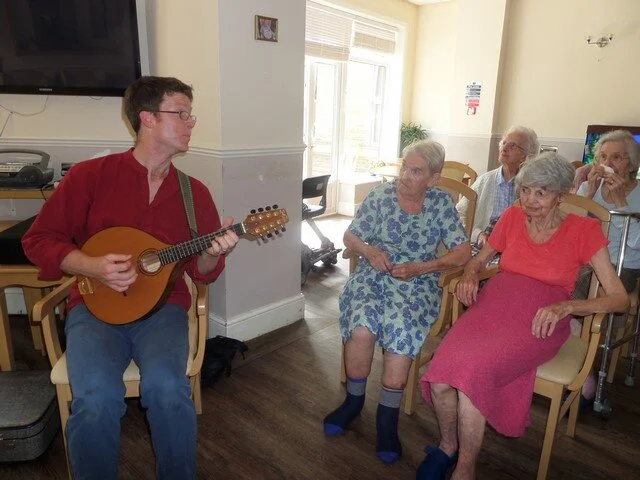The second principle of Rapport-based Musical Communication is:
BE SOCIALLY ENGAGED
Rapport-Based Musical Communication is a social practice and to be socially engaged is therefore a key principle. If the practitioner is not socially engaged and is not making attempts to socially engage with all the participants in a group, then the practitioner is not doing this practice.
What does it mean to be socially engaged and how does this differ from the first principle of being responsive? To be socially engaged means to try to establish dialogue with the participants, whether musical, verbal or non-verbal. To be socially engaged requires that we develop skill in all areas of communication so that we can engage people in the way that is most appropriate for them. For example, a practitioner needs to be skilled in:
musicianship - to establish a positive musical dialogue
non-verbal communication skills - to establish positive dialogue with a person who cannot, or would rather not, speak
verbal conversation - to establish positive dialogue with people who love to, and/or need to, talk.
Remember that the purpose of the approach is to find rapport and all avenues of social engagement are potential opportunities for rapport.
In contrast to the first principle of being responsive, which focuses the practitioner to respond musically to the in-the-moment interests and behaviours of the participants, to be socially engaged reminds the practitioner to respond in the same way to all social opportunities, creating positive connections with all participants in the space, regardless of whether they are engaged in the musical activity. The beauty of music in the context of participatory arts and healthcare is that there are multiple levels of engagement: participants can sing, play, dance or just listen. One aspect of being socially engaged is to find a way to engage with the people at the periphery of the activity, not just those at the centre.
Each principle of Rapport-based Musical Communication links to the three fundamental needs identified in Self Determination Theory, a psychological theory of needs that is supported by a large body of research. The principle of being socially engaged relates to the the psychological need of relatedness which is explained by the originators of the Self-determination theory, Ryan & Deci (2002), as follows :
Relatedness reflects the homonomous aspect of the integrative tendency of life, the tendency to connect with and be integral to and accepted by others. The need to feel oneself as being in relation to others is thus not concerned with the attainment of a certain outcome (e.g., sex) or a formal status (e.g., becoming a spouse, or a group member), but instead concerns the psychological sense of being with others in secure communion or unity.
Rapport-based Musical Communication can meet the fundamental need of relatedness by attempting to establish positive social engagement with all participants in a manner that is most appropriate to each individual. By working in this way, the practitioner can develop a cohesive social group and offer a positive group social experience to people that otherwise are at risk of social exclusion.
To learn about the practice of Rapport-Based Musical Communication, join the online Zoom training on 27th May 2020
Reference
Ryan RM and Deci EL (2002). Overview of self- determination theory: An organismic dialectical perspective. In E.L. Deci & R.M. Ryan (Eds.), Handbook of self- determination research (pp. 3–33). Rochester: The University of Rochester Press.
